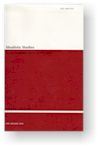|
|
|
1.
|
Idealistic Studies:
Volume >
30 >
Issue: 3
Rolf Ahlers
History and Philosophy as Theodicy:
On World History as the World's Judgment
view |
rights & permissions
| cited by
|
|
|
|
|
|
|
2.
|
Idealistic Studies:
Volume >
30 >
Issue: 3
Giuseppina D'Oro
On Collingwood's Rehabilitation of the Ontological Argument
abstract |
view |
rights & permissions
| cited by
The paper is divided in two parts. In the first I consider the nature of Ryle's attack on Collingwood's appropriation of the ontological argument and Collingwood's defence in the unpublished correspondence. In the second, I go beyond the confines of the Ryle-Collingwood exchange in the mid 'thirties to say something much more general about the nature of Collingwood's metaphysics as well as to advance an explanation of the compatibility of Collingwood's combined defence of descriptive metaphysics and the ontological proof.
|
|
|
|
|
|
|
3.
|
Idealistic Studies:
Volume >
30 >
Issue: 3
Sean Erwin
The Political Efficacy of Prophetic Madness:
Imaginatio in the Tractatus Theologico-Politicus
abstract |
view |
rights & permissions
| cited by
In this paper I pursue this question of the nature of a possible relationship between imagination and the force/violence particular to human law throughSpinoza's analysis of the prophetic imagination in the Tractatus-Theologico Politic us. My principal concern is to trace the relationship between the history and laws of the Hebrew nation and Spinoza's analysis of the imagination of Moses.
|
|
|
|
|
|
|
4.
|
Idealistic Studies:
Volume >
30 >
Issue: 3
Richard McDonough
Aristotle's Critique of Functionalist Theories of Mind
abstract |
view |
rights & permissions
| cited by
The present paper argues that Burnyeat's view is fundamentally correct, but approaches the issues from a somewhat different angle. The claim that forAristotle the form and the matter are non-contingently related is an allusion to Aristotle's difficult doctrine of the unity of substances. The functionalist interpretation underestimates Aristotle's doctrine of the unity of substance. Irwin thinks that Aristotle's view is a version of functionalism but acknowledges that his claims go beyond what is normally associated with functionalism. But Irwin too fails to take sufficient account of his own acknowledgement of the importance of the unity of substance doctrine. The proper appraisal of the functionalist interpretation cannot, therefore, avoid the "abyss" of the Metaphysics.
|
|
|
|
|
articles |
|
5.
|
Idealistic Studies:
Volume >
30 >
Issue: 2
Jeffrey Bernstein
The Irreducibility of the Ontic
view |
rights & permissions
| cited by
|
|
|
|
|
6.
|
Idealistic Studies:
Volume >
30 >
Issue: 2
Allegra De Laurentiis
Aristotle in the Nineteenth Century:
The Case of Goethe’s Study of Life
view |
rights & permissions
| cited by
|
|
|
|
|
7.
|
Idealistic Studies:
Volume >
30 >
Issue: 2
G. Steven Neeley
Schopenhauer and the Platonic Ideas:
A Reconsideration
view |
rights & permissions
| cited by
|
|
|
|
|
8.
|
Idealistic Studies:
Volume >
30 >
Issue: 2
Gary Overvold
Husserl’s European Reason and the Phenomenology of Nature
view |
rights & permissions
| cited by
|
|
|
|
|
9.
|
Idealistic Studies:
Volume >
30 >
Issue: 1
Jane Duran
A Problem Taken from Bonjour’s Coherentism
view |
rights & permissions
| cited by
|
|
|
|
|
10.
|
Idealistic Studies:
Volume >
30 >
Issue: 1
David H. Lund
Materialism and the Subject of Consciousness
view |
rights & permissions
| cited by
|
|
|
|
|
11.
|
Idealistic Studies:
Volume >
30 >
Issue: 1
Alan L. T. Paterson
The Successor Function and Induction Principle in a Hegelian Philosophy of Mathematics
view |
rights & permissions
| cited by
|
|
|
|
|
12.
|
Idealistic Studies:
Volume >
30 >
Issue: 1
Eric M. Rubenstein
Experiencing the Future:
Kantian Thoughts on Husserl
view |
rights & permissions
| cited by
|
|
|
|
|
13.
|
Idealistic Studies:
Volume >
30 >
Issue: 1
George J. Seidel
The Fate of Innate Ideas in Fichte
view |
rights & permissions
| cited by
|
|
|
|
